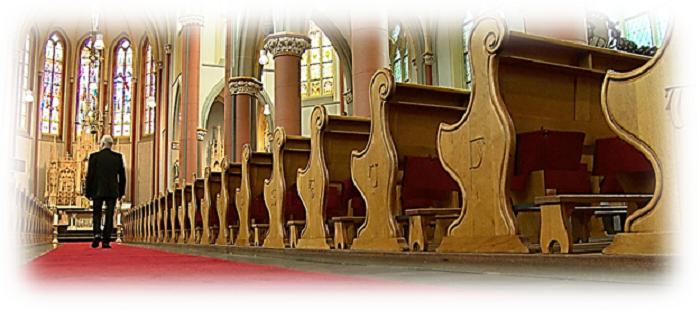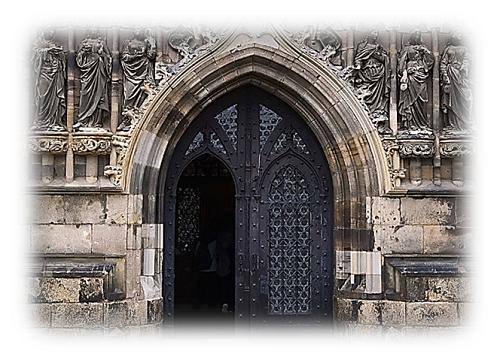Is the Church on Her Way Out?
Is the Church on Her Way Out?

It seems that the Church of Christ has fallen on hard times these days. Church attendance in Canada is at an all time low. A recent poll indicates that 18% of Canadians profess to have no religion at all. And of the rest, only 20% regularly attend church and they, for the most part, view their religion as a strictly private affair. What they profess to believe on Sunday has little or no impact on how they view life and the world the rest of the week. Prominent politicians such as Paul Martin (RCC) and John Manley (Anglican) who are competing for the Liberal Party leadership position have publicly admitted as much. While both claim to be personally opposed to abortion, homosexuality and same-sex marriages, they will not, if elected to the Prime Minster's office, oppose the pro-choice and gay agendas. They simply will not let their private opinions influence their public policy positions and decisions.
Banished from the Public Square⤒🔗
This is indicative of the way most Canadians view the church and her role in society today. The church, many believe, serves those who need a spiritual and psychological crutch to lean on (although increasingly secular psychiatrists and counselors are taking over that role from the clergy). For others, the church helps people go through life's "rites of passage; " it is the place where one gets "hatched, matched and dispatched," (baptized, married and buried). But when it comes to the real world, the world of politics, science, economics and business, the church and her message are irrelevant. We are today living in the era of the Naked Public Square, as John Neuhaus characterizes public life, minus God and His Word. Another way of putting it is to say that we live in a post‑Christian or post-modem world.
What do people mean when they speak of a post-Christian world or society? The term indicates that the time when Christianity was a powerful force in society is now past. Today, we live post or after that era. Let us be sure, however, that we understand what the word "post" or "non" Christian does not and cannot mean. "Non-Christian world" does not mean that the world created by God now exists without God. Nor does it mean that God is no longer active in this world or that Christ from His throne in heaven has lost interest in what's going on down here or that the Spirit and His saving work has come to an end.
It simply means that the world acts as though God does not exist and that His Son was never born of the Virgin Mary, died on the cross and rose from the grave, as if His Spirit was never poured out at Pentecost to bring sinners to repentance and faith in Christ. It means that foolish and wicked people have ignored God's Word, rejected His anointed Son and resisted His Spirit so that He no longer strives with them. Therefore, it also means that the world lives in despair, has no idea how to solve its problems and, worst of all, that it lies under the judgment of the Holy One whose judgment will be made complete on the last day.
The Christian's Attitude←⤒🔗
It is easy for Christians to become depressed at the sight of such a non-Christian-world. We still sing "Christ shall have dominion over land and sea," but not always with the conviction that should be there. Does it not look as if Satan, and not Christ, is winning the battle for men's hearts and minds? At least in Western nations this seems to be the case.
Yes, it is easy to become depressed, and intimidated as well. But that is wrong; that is sinful. The apostle Paul once wrote to Timothy, his spiritual son, who was also given to depression and discouragement: "God has not given us the spirit of fear, but of power and of love and of a sound mind" (2 Tim. 1:7). Think, Timothy, Paul means, use your head; the Lord has given you brains. The enemies of the Gospel who oppose you are only men. They cannot destroy the cause of Christ on earth. His cause will triumph. His church will survive.

We should never forget this. One of the five points of Calvinism is the perseverance of the saints. What a tremendous comfort this doctrine gives to believers! To realize that the Lord will never abandon the work of grace in the hearts and lives of His people is a precious truth indeed! But there is another, related truth, that we should hold on to as well for our comfort and encouragement. It is that the Lord will also preserve His church. It was this conviction, namely that the Church of Christ is indestructible, that kept men like Augustine, Luther and Calvin from despair in their day. And this same conviction should support us when we observe the sad state of Christ's Church today.
The Church Belongs to God←⤒🔗
We believe one holy catholic or universal church and that church will continue until her Lord will call her "home". Although the church at certain times in history and in various places appears virtually extinct, yet there are always some who worship Him in spirit and in truth. As our Confession of Faith affirms: This Church has been from the beginning of the world and will be to the end thereof, which is evident from this that Christ is an eternal King who without subjects cannot be. And this holy Church is preserved or supported by God, against the rage of the whole world; though she sometimes (for a while) appears very small, and in the eyes of men, to be reduced to nothing" (Art. 27). The foundation is standing sure and the Lord knows who are his (2 Tim. 2:9). God will not leave Himself without a witness in the world (Acts 14:17).
The church's future is not left to chance or to the will of man, but to the work of the Spirit and God's grace. Many branches of the Vine may drop off in the fierce storms of cultural change. Once vital churches and reigning theologies have vanished and ended up in the dustbin of history. But the church as body of Christ and pillar of truth will be preserved till the end of time. It is a Reformed conviction, shared indeed by all biblically orthodox Christians that the destiny of the believing church is eternally secure. Of course, saving faith remains the crucial condition of participating in this secure future, and therefore the need for self-examination whether we are "in the faith" remains. Yet necessary as such self-inquiry may be, the perseverance of individual believers and the Church as Christ's body lies in the preservation of both by the power of the Holy Spirit.
Meanwhile, the ship of the church sails on the turbulent seas of history and is exposed to all the hazards that accompany life in this sin-cursed world. Satan attacks her. Secular philosophies seek to undermine the truth upon which she is founded. Heresy is an ever-present danger. Controversy and disunity are never far away. A Laodicean spirit can and does put the church to sleep all too often. Yet, for all that, the Holy Spirit does not abandon the Church. After every period of decline and drowsiness He raises up men to issue a wake-up call, expose error and defend the truth. "By schisms rent asunder, by heresies distressed, yet saints their watch are keeping." Because of the promised guidance of the Spirit, the Church does not ever fall entirely away from the faith once delivered to the saints (Jude 3).
The Church's Task←⤒🔗
This does not mean that all denominations and churches that call themselves by the name of Christ will be preserved. Only those who love, defend and practice the truth as it is in Jesus will endure. "Insofar" as "she lets herself be taught by the Holy Spirit through the Word of God," Calvin argues, "the church cannot err in things necessary for salvation." Particular denominations and congregations may lapse, relapse, or collapse, the elect of God will not fall away from salvation, due to the Spirit's guidance.
Error or false teaching may destroy many segments of the visible church on earth, but the Lord will never allow all manifestations of the Body of Christ to err simultaneously. There has never been a time when the church in its totality went astray. The church that Christ gathers by His Spirit and Word agrees in true faith (Heidelberg Catechism, LD 21) and cannot fall irretrievably into apostasy. This does not mean, however, that the church is exempt from making mistakes or errors of judgment. Since the recipients of God's saving grace are fallible persons, even true churches are prone to go astray in certain areas, but never to the extent that essential truths are lost. The guidance of the Spirit ensures that salvation by grace through faith in Christ crucified will remain the foundation on which the church is built.

Those who think they must separate themselves from a less than perfect church in the hope of starting another one that is completely free from error, are chasing after a pipe dream and an illusion. Provided the biblical marks of a true church are present (Belgic Confession, Art. 28) we should not be too quick to leave a denomination or congregation in which God has given us a place and a task. That task is to edify or build up the Body of Christ. "Everyone should know it to be his duty, readily and cheerfully to employ his gifts for the advantage and salvation of other members" (L.D. 21) Even if the preaching is not as balanced as we would like or certain elements in the liturgy bother us, we should exercise patience and work towards improvement. The Lord can change things even when from the human point of view things look very discouraging. To quote Thomas Oden, a former liberal but now orthodox theologian:
Among diseases of the history of sin that continue to plague the church and resist its full growth are: the partisan spirit that would divide it, the heretical spirit that would lead it to distort or forget apostolic teaching, the antinomian spirit that turns Christian liberty into libertinism, the legalistic spirit that would turn grace into law, the naturalistic spirit that would treat grace as a determinant of nature. Despite these infirmities and challenges, which are permitted by a kind Providence to strengthen the church and enable it to grow stronger, the body lives on, the vine sends forth new shoots, the Spirit enlivens and heals, the Head continues to guide and order the whole organism (John 15:1-5; Col. 1:18).
Renewal and reformation do not come by refusing fellowship with fellow believers with whom we may differ on minor issues. Neither does it come by parting company with those we consider "hopeless cases." The self‑righteous of all periods are loath to fellowship with sinners, unlike Jesus who received sinners and ate with them (Luke 15:2). To quote Oden again:
The body of Christ continues to struggle against tendencies toward a Montanism that would exclude sinners based on their lack of Spirit, a Donatism that would exclude sinners based upon a questionable ministry, and a purist Novatian rigorism that would exclude sinners based upon their moral deficiencies.
The history of the church is the record, not of uninterrupted progress in holiness, but of God's forgiving and restoring grace. Pascal in his Pensees (Thoughts) pictured Christianity as having appeared a thousand times on the point of universal destruction, and every time that it has been in this condition, God has raised it up by some extraordinary stroke of his power." Each seeming defeat prepares the church for a deeper level of understanding. Each apparent victory readies her for a deeper level of conflict. In fact, the times when the church enjoyed the greatest outward triumphs have often been followed by periods of sharp spiritual decline.
It is our lot to live in such a period today. We have to get used to the fact that from a majority we have become a minority. We have lost the privileged position we once enjoyed as Christians. As W. Aalders wrote some years ago in his book, In Verzet Tegen de Tijd, (Opposing the Times), "Christ has taken off the garment of outward signs. Instead, He now wears the garment of shame and scorn." That means His people must don the same garments. We must be willing to accept ridicule and become fools for Christ's sake. The Lord is evidently leading His Church in a downward direction in this time frame and we do not know how much deeper she may have to go before He will lead her upward again. The bitter lament of the psalmist in Psalm 74 may yet be wrung from our lips as well:
We see no signs of power divine
No prophet speaks for Thee,
And none can tell and none can know
How long these woes shall be. Psalter 205:6
Christ Keeps His Church←⤒🔗
During the last night of His life, Jesus celebrated the first Lord's Supper with His followers. There He was, the One whom the Jews at one point had wanted to crown as King, breaking bread with His disciples. Everything had gone wrong, it seemed. He was facing arrest and execution. His way would lead through the deepest darkness and sorrow. All outward signs of His glory had disappeared. Only He is left, despised by His enemies, but loved by His friends! To them He commits Himself. That is, He gives Himself totally to them. He calls them friends. He is open with them and communicates Himself to them in the symbols of bread and wine. Yes, those were the only signs that remained and which are still with us today. That is why the Lord's Supper is a feast, a foretaste of heaven and the Marriage Supper of the Lamb. To this feast are invited all those who no longer depend on outward and visible signs of the Church's glory but for whom the person of Christ is enough. They rest in His promise that He will be with His Church always even until the end of the world.

The deepest descents into spiritual decline and ineffectiveness, yes, irrelevancy, have been followed repeatedly by reformation and revival led by such eminent men as St. Augustine, Bernard of Clairvaux, Luther, Calvin, Whitefield, the Wesleys, Edwards, Spurgeon, and many others. Christ's promise of preservation has proved true again and again. Even against impossible odds, the gates of hell have not prevailed against the true ecclesia. It will happen again in God's own good time and way. May the Lord give us the grace to remain faithful unto death so that we may be part of the multitude no man can number that will receive the crown of life.

Add new comment